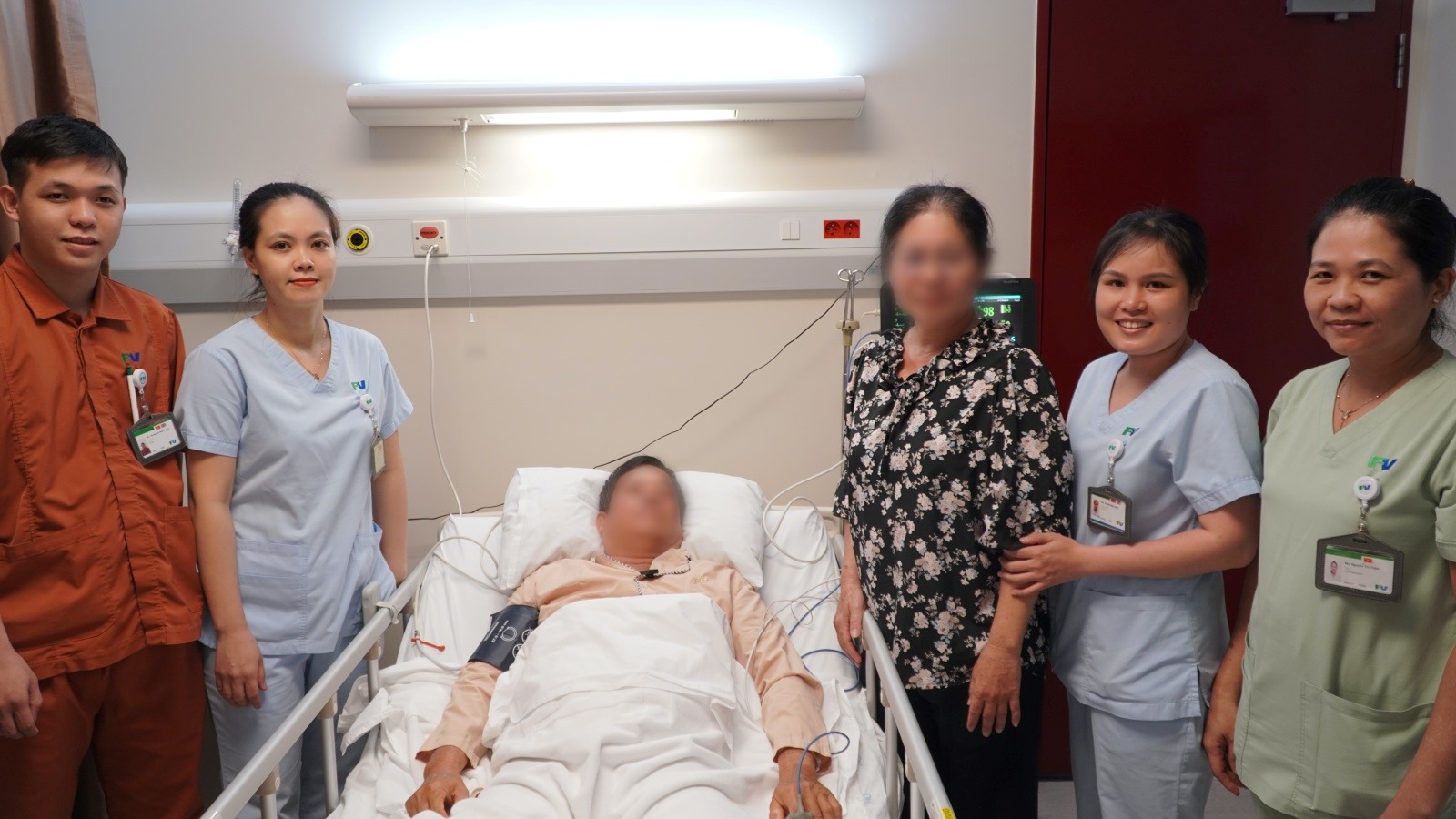A Cambodian patient suffering a stroke caused by a brain arteriovenous fistula was spectacularly saved at FV Hospital thanks to an advanced endovascular intervention. The successful treatment not only highlights the progress of minimally invasive medicine but also underscores the expertise of FV’s interventional radiology team.
A sudden stroke triggered by an unusual vascular condition
One seemingly ordinary morning, N.V. (56 years old) woke up with a severe headache, his vision quickly blurred, and he collapsed to the floor. His family rushed him to a nearby hospital, where a CT scan revealed bleeding in the left posterior part of his brain. The cause was arteriovenous malformations and fistulas — abnormal direct connections between arteries and veins in the brain. This allows high-pressure arterial blood to flow straight into the veins, potentially leading to life-threatening complications.

Doctors in Cambodia provided initial emergency care but advised the family to transfer the patient to a center with expertise in intracranial vascular intervention to prevent recurrent bleeding. Hoping for a non-surgical solution, the Cambodian medical team recommended FV Hospital in HCMC, Vietnam.
Brain surgery without a scalpel
FV Hospital received the patient in critical condition. After clinical evaluation and CT imaging — along with the medical records sent from Cambodia — Dr. Huynh Huu Danh of the Interventional Radiology Unit decided to treat the patient using an endovascular procedure to occlude the cerebral arteriovenous fistula.
Endovascular intervention can definitively correct the abnormal connection. Once the fistula is sealed, blood flows through normal, healthy vessels without compromising the patient’s neurological function.
“We used a Digital Subtraction Angiography (DSA) to map the blood vessels in detail, then navigated a microcatheter from the femoral artery up to the brain, directly to the fistula site, where we injected a medical-grade embolic agent to seal the abnormal vessel”, Dr. Danh explained. “The procedure requires near-absolute precision — being off by even a few millimeters can affect brain function”.
After three hours in the Interventional Catheterisation Laboratory (Cathlab), the fistula was completely closed. The patient was kept under general anesthesia to ensure maximum safety and precision throughout the procedure.
The patient recovered well following the procedure. After two days of monitoring, he was discharged in stable condition. His family expressed immense gratitude for the minimally invasive treatment that saved his life.
“Dr. Danh explained everything clearly and thoroughly. The nursing staff was quick, caring, and professional. FV’s service is excellent — I made the right decision bringing my husband from Cambodia to FV for treatment”, the wife shared.

During a follow-up visit in late September 2025, Dr. Danh confirmed that the patient’s headaches had resolved and his vision had fully recovered. CT scans showed the fistula was completely sealed. Mr. N.V. had returned to his normal daily activities and work.
No open surgery, fewer risks
Endovascular intervention represents a major breakthrough in treating stroke, aneurysms, arteriovenous malformations, and fistulas. Instead of opening the skull, doctors navigate through blood vessels to treat the problem “from inside”, reducing pain, complications, and hospital stay.
In Vietnam, FV is among the few private hospitals with an internationally certified Cathlab and state-of-the-art DSA system capable of performing such interventions. Its medical team is highly trained and experienced in treating both adults and children.
Dr. Huynh Huu Danh graduated from Pham Ngoc Thach University of Medicine in 2016 and earned Specialisation Degree Level I certification in Radiology from the University of Medicine in 2023. With more than 10 years of experience in endovascular intervention, he specializes in treating Stroke, Aneurysms, Arteriovenous Malformations and Fistulas; Transarterial chemoembolisation (TACE) for liver cancer and other cancers; Prostate artery embolisation for benign prostatic hyperplasia, Uterine fibroid embolisation; Transarterial chemotherapy (IAC) for retinoblastoma, etc. He is also one of the few specialists capable of performing endovascular procedures on both adults and children.

For more information on endovascular intervention for stroke treatment, readers may contact FV Hospital at 06 Nguyen Luong Bang, Tan My Ward (formerly District 7), HCMC, or call (028) 3511 3333. Emergency hotline: (028) 3511 3500.









